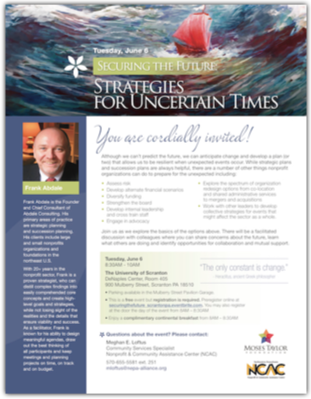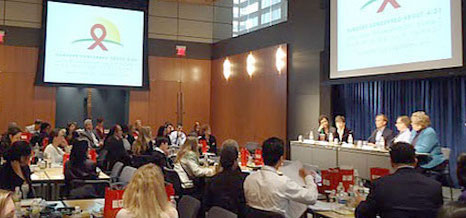The Board’s Role in Fundraising
A primary responsibility of any board is ensuring the organization has the resources it needs to meet its mission. We discuss how the board can fulfill this responsibility by:
- Ensuring there is a viable development plan in place;
- Partnering with staff to meet annual fundraising goals;
- Helping to identify and cultivate potential donors;
- Owning their responsibility to act as ambassadors for the organization;
- Making a personal gift;
- Soliciting donations from their extended personal universe;
- Enhancing the board’s capacity to fundraise; and
- Helping create and sustain a culture of philanthropy throughout the organization.
We also discuss some often thorny issues including:
- Instituting “Give/Get” policies;
- Requiring 100% board giving;
- Shifting board culture and transitioning from to a fundraising board;
- How to establish and communicate fundraising expectations to current and new board members; and
- How to manage board members who don’t give.
Finally, we look at activities related to effective sustainable fundraising, including the board’s role in Advocacy, Communications and Strategy Development in uncertain times.
WEBINAR: Establishing Expectations for Board Fundraising
Based on content covered in the popular workshop “The Board’s Role in Fundraising”, this webinar examines how to create a culture of philanthropy among your board members.
Strategic Planning: Creating a Roadmap for Uncertain Times
A good strategic plan helps you create a shared vision for the future that is grounded in your values and realized through your mission. A plan with clear and elastic strategies can help you keep your eye on the prize no matter what happens along the way. At its best, strategic planning is a reflective and collaborative process that lets you step back from day-to-day responsibilities and think about where you want to be in 3-5 years and what you need in order to get there. It results in a set of overarching goals with realistic strategies for achieving those goals. A successful strategic plan is supported by a detailed development and implementation plan with a series of objectives and tactics that together create a blueprint for the future.
The successful completion of a strategic planning process can result in:
- Clear mission statement;
- Compelling vision for the future that will excite and engage all stakeholders;
- Statement of core values to guide short-term and longer-term decision making;
- Shared understanding of the strategic issues facing your organization and a set of goals, strategies and initiatives that will address those issues;
- A deep understanding of the external philanthropic, programmatic, political, and economic trends that impact your field;
- A roadmap for financial sustainability and diversification utilizing traditional and entrepreneurial income generation;
- A dynamic communications and marketing strategy;
- An assessment of the infrastructure and human resources needed to achieve and sustain successful growth; and
- Realistic performance measures designed to assess your impact as you implement the plan.
A thoughtful and inclusive planning process will also ensure:
- Buy-in for the plan from the board and staff; and
- Interest in the plan and support from external stakeholders including funders, partners and allies.
This workshop is an introduction for those with no experience in strategic planning and a review of the process for those with some experience in strategic planning. In this workshop, participants:
- Learn about best practices in strategic planning and how to articulate strategic questions to guide the process.
- Learn how to assess internal strengths and weaknesses, external opportunities and threats, and how to use that information to shape goals.
- Learn how to engage board, staff and other stakeholders in the planning process.
- Discuss how to develop an RFP that will help you find the right consultant.
- Review the average costs of strategic planning.
- Learn how to monitor and adapt plans going forward.
Succession Planning for Leadership Transitions
The departure of a chief executive, particularly a long-time leader, can create a very challenging environment for everyone involved in, or impacted by, the transition. Issue areas can include:
- Hiring and onboarding a new chief executive is one of the most critical tasks that a board of directors will ever take on;
- Leaving an organization can mean a loss of identity and other personal and financial challenges for a long-time leader;
- Working with an organization without a strong leader in place can create a sense uncertainty and anxiety for clients and staff; and
- Through it all, funders, volunteers and other stakeholders may be looking on with concern about the impact on their investments of time, money and other resources.
With all this at stake, succession planning for a chief executive needs to be a thoughtful, thorough and data-informed process. When handled well, this challenging and emotional situation can become an inspiring and strategic opportunity.
During this interactive workshop, participants will learn about:
- How to start, and how to frame, the conversation about succession planning with entrenched leaders;
- Various succession planning scenarios – planned and unplanned transitions, internal or external candidates, etc.;
- The full range of a transition planning process – Assessment, Visioning, Search/Hire, On-Boarding and Ongoing Support;
- The critical questions to ask during a successful planning process;
- How to repurpose data collected through the planning process;
- How to build a culture of leadership development for both staff and board;
- The use of interim executives and interim senior staff during a transition;
- When and how to engage external stakeholders;
- How and why to use an outside consultant to facilitate the process;
- How to maintain and steward key relationships during a transition; and
- The fundraising and communications opportunities in honoring a departing leader and introducing a new one.
Participants will receive tools, templates and links to additional Resources.
Who should attend:
Executive staff, particularly long-term leaders;
Board members;
Funders who support grantees with long-term leadership; and
Anyone interested in learning more about succession planning
Contact Fabdale@abdaleconsulting.com for a copy of our Succession Planning Literature Scan.
Working With Consultants
Consultants can help you raise money, develop your board, train your staff and significantly increase your capacity in many other ways. But when is the right time to bring in a consultant? How do you choose the right one? What can you expect to pay? And how do you manage the relationship to maximize impact?
This interactive workshop (or webinar) can answer these and other questions, and offer insight into the benefits, challenges and nuances of working with consultants.
Participants will learn about:
- When (or if) you should work with consultants
- How consultants can save you money
- Types of consultants and consulting services
- How to choose a consultant
- Characteristics of an ideal consultant
- Consultant contracts
- Averages costs for different types of consulting services
- Managing the consultant relationship to maximize impact
- Legal and ethical considerations in using consultants
- Additional resources
Secure the Future – Building a Diversified Development Effort

(click to view larger)
The healthiest, most sustainable nonprofits are those with multiple funding sources to support their work. This workshop explores what it takes to expand and sustain a blend of support from individuals, foundations, corporations, and government agencies. Learn about the infrastructure you’ll need for success in each of these areas, as well as the roles of staff, board, technology, and communication materials. This session will address a variety of fundraising techniques, including direct marketing, online fundraising, social media, and special events.
Participants will have an opportunity to discuss their current development efforts with colleagues and fundraising experts, and will discover strategies for expanding their development efforts in viable ways, with a list of resources for the future. Topics include:
- Building and maintaining relationships with donors that can deepen over time
- Identifying new opportunities for fundraising
- Demonstrating leadership in one’s field
- Investing in the infrastructure necessary to support success
- Using your brand to bolster fundraising
- Creating short-term and long-term development goals
- Understanding that successful development is an ongoing, constant effort
Effective Advocacy
What makes an advocate effective? How do we make our issue rise above the general clamor for attention? How do we get from vision to policy? This interactive workshop answers these questions – and more – as we explore the tools and strategies needed to become an effective advocate. Participants will develop a broad strategy for their own policy issues and leave the workshop with practical tools, a sense of empowerment and confidence in their own ability to advocate. Topics include:
- How to prepare and present a compelling argument
- The distinctions between advocacy and lobbying
- The relationship between grassroots and national advocacy
- Essentials of coalition building
- Personal and professional development needed for effectiveness
- Developing metrics for effectiveness
The Power of Collaboration
Mission-driven, values-based collaborations can expand an organization’s reach and deepen its impact. This interactive workshop explores the best practices of collaborations that can make an organization more effective in advocacy, administration, program delivery and/or fundraising. Successful collaborations can raise an organization’s profile among funders, donors, volunteers, clients, legislators and other stakeholders, and thereby create increased communication opportunities and strengthening the organization’s development and advocacy activities. Participants will identify issues on which they can collaborate and potential partners with whom they can work.
“The social problems that nonprofits are tackling are growing in both magnitude and complexity, funding is failing to keep pace. Networks do not require more resources, but rather a better use of existing resources. And so networked nonprofits are uniquely poised to face the perennial challenge of the nonprofit sector: achieving lofty missions with decidedly humble means.” – The Networked Nonprofit, Stanford Social Innovation Review, Spring 2008
Right From the Start – Building a New Nonprofit
Starting a new nonprofit is a challenging endeavor and it is important to get it right from the start. You not only create the organization’s structure but you also lay the foundation for its culture. This interactive workshop will:
- Provide an overview of the nonprofit sector
- Identify how to assess if a new nonprofit is the most efficient way to have an impact
- Discuss alternative impact strategies
- Review the life-cycle of a nonprofit
- Identify what it takes to set up a legally compliant and well managed nonprofit organization – governing documents, organization policies & internal controls, the role and evolution of the board, and the difference between governance and management
- Help you create a culture that will inform and direct an organization’s efforts for generations to come
- Offer a wealth of resources
 Abdale Consulting offers a wide range of well-received customized trainings in workshop, webinar and seminar formats.
Abdale Consulting offers a wide range of well-received customized trainings in workshop, webinar and seminar formats.